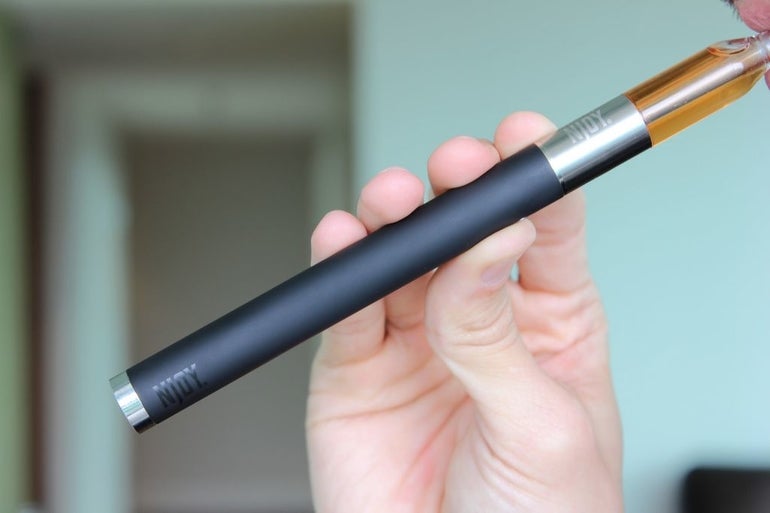The national outbreak of lung illnesses associated with vaping is continuing “at a brisk pace,” federal public health officials said Thursday, adding that they are concerned that dangerous vaping products, regulated and illicit products alike, could still be available.
The U.S. Centers for Disease Control said Thursday it is intensifying its recommendations that people refrain from using e-cigarettes or vaping products, particularly those that vaporize THC derived from marijuana, until officials can get a handle on the problem.
In Massachusetts, Gov. Charlie Baker has imposed a four-month ban on the sale of all vaping products, but the CDC said it is worried that the product or products making people sick might still be available legally elsewhere or on the illicit market.
“We’re concerned that risky product is still available and that’s one of the reasons that we have intensified our recommendations and warnings,” Dr. Anne Schuchat, principal deputy director of the CDC, told reporters. “We haven’t seen a measurable dropoff in the occurrence of new cases and so we don’t feel that either individuals have changed their behaviors or the products are gone.”
As of Tuesday, 1,080 lung injury cases associated with the use of e-cigs or vaping products have been reported to CDC from 48 states and the U.S. Virgin Islands. Eighteen deaths have been confirmed across 15 states, the CDC said Thursday.
There have been 275 additional cases reported to the CDC in the last week, a combination of new illnesses and newly-reported illnesses that occurred earlier this year, Schuchat said. Seventy percent of the patients are male and 80 percent of patients are younger than 35, she said.
The CDC has detailed information from 578 patients about the vaping products they used in the three months leading up to the onset of their illness. Schuchat said 78 percent of patients reported vaping THC, with 37 percent saying they vaped only THC. About 58 percent reported vaping nicotine and 17 percent said they vaped only nicotine.
“I wish we had more answers regarding the specific harmful products or components that are causing these illnesses,” she said.
Judy McMeekin, deputy associate commissioner for regulatory affairs at the U.S. Food and Drug Administration, said her agency “remains focused on better understanding whether there is a relationship between any specific product and substance and the reported illnesses.”
The FDA, she said, has been collecting product samples and coordinating with state public health agencies as it tries to identify exactly what is making people sick. McMeekin raised the possibility of criminal prosecution if a person or company is found to be responsible.
“We are focused on identifying the products that are making people ill and following the supply chain to the source,” she said. “If we determine that someone is manufacturing or distributing illicit, adulterated vaping products that cause illness or death for personal profit, we would consider that a criminal act.”
McMeekin said investigating these lung illnesses is the FDA’s “top priority.”
Asked by a reporter whether the agencies are eyeing illicit THC vaping cartridges as the primary culprit, Schuchat said that it is too early for the CDC to narrow its investigation.
“We do have a lot of concerns about black market sources, I think it’s premature for us to rule out other concerning products,” she said. “The Illinois and Wisconsin report from last week did find that most of the individuals had gotten their THC-containing products from informal sources off the street … but at this stage in the investigation, we really need to keep an open mind.”
Last week, the CDC published a report that found that 87 percent of patients interviewed in Illinois and Wisconsin had vaped THC in the preceding three months and that 89 percent of those THC vape cartridges were “primarily acquired from informal sources (e.g., friends, family members, illicit dealers, or off the street).”
“The predominant use of prefilled THC-containing cartridges among patients with lung injury associated with e-cigarette use suggests that they play an important role,” the study authors wrote.
In Massachusetts, the Department of Public Health has reported 10 cases of vaping-related lung injury to the CDC. Unlike the national trend that has seen two-thirds of vaping-related lung injury cases occurring in men, seven of the 10 cases reported by Massachusetts have been diagnosed in women. Eighty percent of the Massachusetts cases reported to the CDC have also resulted in hospitalization.
In September, President Donald Trump announced that he was directing the FDA to issue guidance to ban the sale of all flavored vaping products, except the tobacco flavor. Trump’s health and human services secretary said at the time it would take “several weeks for us to put out the final guidance that would announce all the parameters around the enforcement policy.”
“Then there will likely be about a 30-day delayed effective date, as is customary with FDA’s good guidance practices. And, at that point, all flavored e-cigarettes, other than tobacco flavor, would have to be removed from the market,” Secretary Alex Azar said on Sept. 11. “Tobacco-flavored e-cigarettes — their manufacturers would, by May 2020, have to file for approval for FDA of their products. The other flavored product manufacturers can, at any time, also file, but they would be off the market until approved by FDA.”

